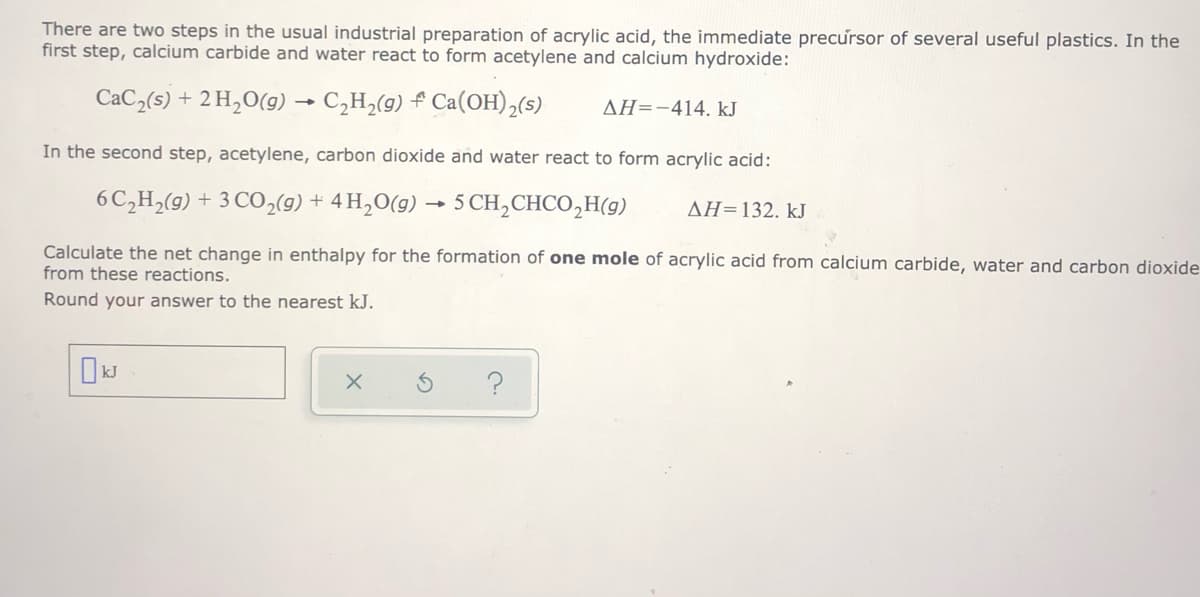tWo steps in thể usual industrial preparation of acrylic acid, the immediate precursor of several useful plastics. first step, calcium carbide and water react to form acetylene and calcium hydroxide: CaC,(s) + 2 H,O(g) → C,H,(9) f Ca(OH),(s) AH=-414. kJ In the second step, acetylene, carbon dioxide and water react to form acrylic acid: 6 C,H2(9) + 3 CO,(9) + 4 H,O(g) → 5 CH,CHCO,H(9) AH=132. kJ Calculate the net change in enthalpy for the formation of one mole of acrylic acid from calcium carbide, water and carbor from these reactions. Round your answer to the nearest kJ.
tWo steps in thể usual industrial preparation of acrylic acid, the immediate precursor of several useful plastics. first step, calcium carbide and water react to form acetylene and calcium hydroxide: CaC,(s) + 2 H,O(g) → C,H,(9) f Ca(OH),(s) AH=-414. kJ In the second step, acetylene, carbon dioxide and water react to form acrylic acid: 6 C,H2(9) + 3 CO,(9) + 4 H,O(g) → 5 CH,CHCO,H(9) AH=132. kJ Calculate the net change in enthalpy for the formation of one mole of acrylic acid from calcium carbide, water and carbor from these reactions. Round your answer to the nearest kJ.
Introduction to General, Organic and Biochemistry
11th Edition
ISBN:9781285869759
Author:Frederick A. Bettelheim, William H. Brown, Mary K. Campbell, Shawn O. Farrell, Omar Torres
Publisher:Frederick A. Bettelheim, William H. Brown, Mary K. Campbell, Shawn O. Farrell, Omar Torres
Chapter4: Chemical Reactions
Section: Chapter Questions
Problem 4.20P: 4-20 Calcium oxide is prepared by heating limestone (calcium carbonate, CaCO3) to a high...
Related questions
Question
100%

Transcribed Image Text:There are two steps in the usual industrial preparation of acrylic acid, the immediate precursor of several useful plastics. In the
first step, calcium carbide and water react to form acetylene and calcium hydroxide:
CaC2(s) + 2 H,O(g) → C,H,(g) f Ca(OH)2(s)
AH=-414. kJ
In the second step, acetylene, carbon dioxide and water react to form acrylic acid:
6 C,H2(9) + 3 CO,(9) + 4 H,O(g) → 5 CH,CHCO,H(g)
AH=132. kJ
Calculate the net change in enthalpy for the formation of one mole of acrylic acid from calcium carbide, water and carbon dioxide
from these reactions.
Round your answer to the nearest kJ.
?
Expert Solution
This question has been solved!
Explore an expertly crafted, step-by-step solution for a thorough understanding of key concepts.
This is a popular solution!
Trending now
This is a popular solution!
Step by step
Solved in 2 steps with 1 images

Knowledge Booster
Learn more about
Need a deep-dive on the concept behind this application? Look no further. Learn more about this topic, chemistry and related others by exploring similar questions and additional content below.Recommended textbooks for you

Introduction to General, Organic and Biochemistry
Chemistry
ISBN:
9781285869759
Author:
Frederick A. Bettelheim, William H. Brown, Mary K. Campbell, Shawn O. Farrell, Omar Torres
Publisher:
Cengage Learning

Chemistry: Principles and Practice
Chemistry
ISBN:
9780534420123
Author:
Daniel L. Reger, Scott R. Goode, David W. Ball, Edward Mercer
Publisher:
Cengage Learning

Chemistry by OpenStax (2015-05-04)
Chemistry
ISBN:
9781938168390
Author:
Klaus Theopold, Richard H Langley, Paul Flowers, William R. Robinson, Mark Blaser
Publisher:
OpenStax

Introduction to General, Organic and Biochemistry
Chemistry
ISBN:
9781285869759
Author:
Frederick A. Bettelheim, William H. Brown, Mary K. Campbell, Shawn O. Farrell, Omar Torres
Publisher:
Cengage Learning

Chemistry: Principles and Practice
Chemistry
ISBN:
9780534420123
Author:
Daniel L. Reger, Scott R. Goode, David W. Ball, Edward Mercer
Publisher:
Cengage Learning

Chemistry by OpenStax (2015-05-04)
Chemistry
ISBN:
9781938168390
Author:
Klaus Theopold, Richard H Langley, Paul Flowers, William R. Robinson, Mark Blaser
Publisher:
OpenStax

Chemistry for Engineering Students
Chemistry
ISBN:
9781337398909
Author:
Lawrence S. Brown, Tom Holme
Publisher:
Cengage Learning

Chemistry: The Molecular Science
Chemistry
ISBN:
9781285199047
Author:
John W. Moore, Conrad L. Stanitski
Publisher:
Cengage Learning

Chemistry: Principles and Reactions
Chemistry
ISBN:
9781305079373
Author:
William L. Masterton, Cecile N. Hurley
Publisher:
Cengage Learning